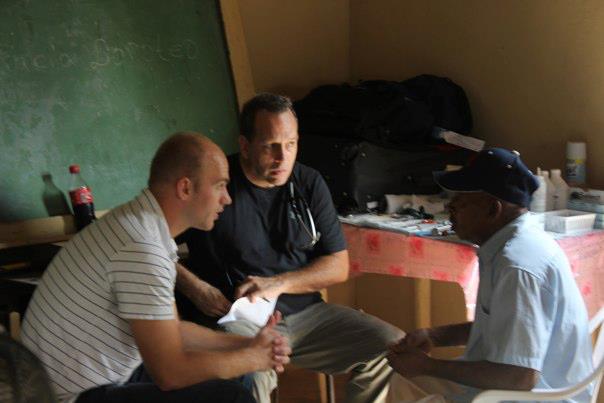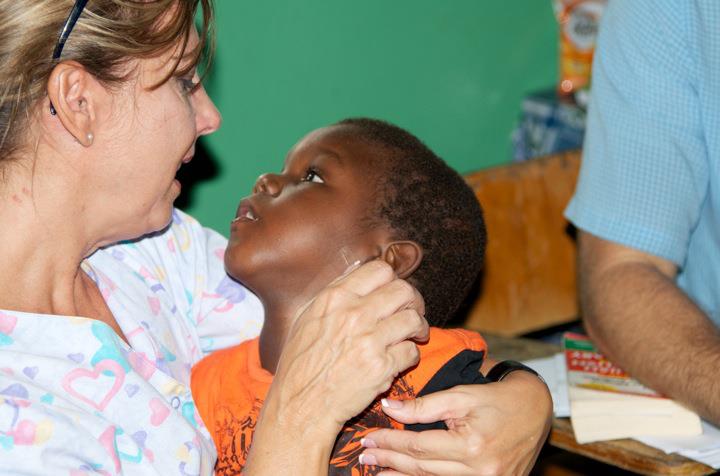![]()
Aaron Roth – HOPE International – September 2011
- Download this email as a pdf: Aaron Roth – September 2011 Update.pdf
- Blog and Support Page: www.AaronRoth.net
- HOPE International Worldwide – www.HOPEinternational.org
- Newsletter Archive: AaronRoth.net – Monthly Newsletters

It was a Tuesday morning when I arrived at the gas station in Guaricanos, an urban community in North Santo Domingo, and Ramona, the loan officer, wasn’t waiting for me on the corner like usual. I looked at my phone. It read “7:33 – missed call from Ramona.” Normally, this meant that she was calling to tell me to wait for her, or, that I should find a ride to the morning bank meeting. Just then, a motorcycle taxi pulls up to the corner. He tells me that Ramona called him to pick me up, he’d take me to the meeting. I hopped on the back.
Normally, I don’t just board motorcycle taxis when they pull up to the curb, but I know him. His name is Christian and he’s the husband of one of our microfinance clients and a good family friend to Ramona. His wife has been with Esperanza (HOPE’s local microfinance partner) for over three years, and he’s the president of the local motorcycle taxi group which includes about 50 motorcycle taxistas. When you’re the president, it means you’re in charge to  make sure all taxis arrive at their appointed stations according to the schedule, all the equipment is repaired, and all disputes about money, territory, and preferred clients are handled with integrity and peace.
make sure all taxis arrive at their appointed stations according to the schedule, all the equipment is repaired, and all disputes about money, territory, and preferred clients are handled with integrity and peace.
It’s work he came by honestly after five years of working as a regular motorcycle taxi driver. With the micro-loan his wife received to start her small store selling fruits and vegetables, their family of three children has had dual-income parents, a rarity in a poor urban community like this. Ramona told me early on in the year that if she was not able to meet me in the morning, Christian would give me a ride. “I trust him, and you can trust him as well. I know his family and he knows mine. He will take care of you and charge a fair rate.”
She’s a Real Hero
I trust Ramona, and I trust the people that Ramona trusts. When I first started my fellowship down here, she took me under her wing to teach me about Microfinance and the day to day operations for how Esperanza works in urban communities like North Santo Domingo. She was more than just a financial advisor, she taught me how to navigate the public transit system, where to buy food, and how to know who to trust. Ramona has been an Esperanza loan officer for over three years and serves over 400 clients which she visits bi-weekly. She’s a single-mom raising four kids and spends her weekends at the university finishing her business administration degree. To me she exemplifies the most necessary qualities of a Christian microfina nce loan officer:
nce loan officer:
- Leads, but as a servant first and foremost.
- Firm, but is kind in all her dealings.
- Caring, but practices tough love.
- Trusts, but verifies with the good records she keeps.
She is what I call one of the real heroes of Christian Microfinance development. I know that you know me personally, and it’s me who tells you the story of Ramona. Very often, I fear that in the monthly newsletters I write to you all, you may think that I single-handedly walk through the rural and ghetto communities of the Dominican Republic providing financial access to the poorest of the poor, read from the Bible, lead songs of worship, preach about the Hope and the love of our Heavenly Father, and manage hundreds of “friendships” who have outstanding loans with Esperanza. Actually, it’s people like Ramona who do all of this on a daily basis, and fortunately, I get to participate.
Devoted to Loving this Community
I show up to the meeting with Christian and he drops me off telling me that I can pay later. He trusts me and he knows that after the second meeting he will give me a lift to the office. He knows the schedule of all of Ramona’s 23 bank meetings. I walk into the patio of a small house where about 35 women are congregated. Ramona looks up from her bookkeeping and smiles saying, “Mi hijo! Cuanto tiempo sin verte! Bienvenido a tu casa” (My son! It’s been so long since I’ve seen you. Welcome back home!) She then introduces me  to the group, but they laugh. They all know me. I’ve been here before, a few times actually. They meet on Tuesdays. Ramona jokes with me that it’s only on Tuesdays that I come to visit her. In fact, my very first day of working in the field almost 10 months ago was a Tuesday, with Ramona. I think to myself. “We’re Tuesday People.”
to the group, but they laugh. They all know me. I’ve been here before, a few times actually. They meet on Tuesdays. Ramona jokes with me that it’s only on Tuesdays that I come to visit her. In fact, my very first day of working in the field almost 10 months ago was a Tuesday, with Ramona. I think to myself. “We’re Tuesday People.”
I had just finished reading “Tuesdays with Morrie” for the second time recently, and I thought of how much Ramona resembled Morrie, a retired ivy-league professor known for his wisdom made popular in a publication of his life lessons. Of course, there are many things a single Dominican woman working in one of the poorest neighborhoods in one of the poorest countries doesn’t have in common with Morrie, but you know what, she is a pure example of what Morrie describes in his book:
“The way you get meaning into your life is to devote yourself to loving others, devote yourself to your community around you, and devote yourself to creating something that gives you purpose and meaning.”
I mention some of this to Ramona, about being Tuesday People, about how real meaning is found in devotion to a community. She nods with affirmation that my words are all very good and true, but to her, “purpose” and “meaning” are found in a small token, a reminder of an ultimate truth: “God is Love.”
She places it in my hand. I realize she is always giving me small tokens of wisdom every time I come. I make the small observation to myself that for someone like her who doesn’t have much money or possessions, she’s really into the habit of giving. Hmm, that’s another token of wisdom I think. How sometimes people who seem to have a lot give the least, and people who can’t seem to afford to give, give the most. She smiles and returns back to business. She asks one of the women to read from the Bible, a Psalm:
“He covers the sky with clouds;
He supplies the earth with rain
and makes grass grow on the hills.
He provides food for the cattle
and for the young ravens when they call.
His pleasure is not in the strength of the horse,
nor his delight in the legs of the warrior;
the LORD delights in those who fear him,
who put their hope in his unfailing love. (Psalm 147: 8-11)”
May God bless you this Tuesday, and may you share it with a Morrie or a Ramona near you.
Dios les bendiga,
-Aaron
aroth@hopeinternational.org
www.AaronRoth.net
Skype: aprothwm05
————————————————————————————————
While I’m volunteering down here in the Dominican Republic, I am still finishing the final part of my fundraising through the remainder of the year. Do pray for the work of HOPE and if you feel led to support me financially, you can find that information here: www.AaronRoth.net/Support


